
Red Special
The Pete Cornish Years
Pete Cornish works and has worked with some of the biggest names in
music.
Designing and constructing sound systems and creating some of the most
recognisable sounds in music history.
Originally working for the Ministry of Aviation, making and testing
military equipment, he went on to become Service Manager at Sound City
which brought him into the music business.
He eventually became self employed and began to make a range of products
from effects and power supplies to complete stage rig systems.
Pete Cornish became involved with Brian May and Queen in 1972.
Brian was experiencing some feedback problems during a visit to a radio
station. Pete found that the Treble Booster was the cause of the problem
being influenced by the radio station mast. Brianís Treble Booster was
a home made version of his original Rangemaster Treble Booster that had
been lost by a roadie at a gig.
Pete designed and built a completely new circuit, which eliminated
the radio interference problems, enhanced the tonal quality and reduced
the noise level.
Brian used the new Treble Booster for the remainder of his career with
Queen.
Brianís original pedalboard consisted of two foot pedals, which controlled
his Echoplex delay boxes, a Foxx phaser pedal and a Treble Booster. The
Foxx phaser pedal and the original Pete Cornish Treble Booster can be seen
in the picture below:
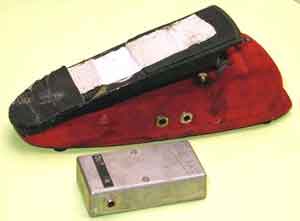
Pete made Brian a double Treble Booster box with bypass switching which can be seen in the picture below:
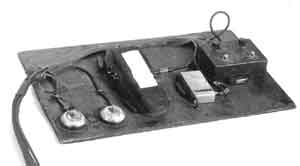
Brian began to use other effects over the years including an Eventide Harmoniser. The unit was not connected to the guitar effects or the amplifiers. This was part of the PA system. The pedal to the right of the board, in the picture below, controlled the effects of the Eventide Harmoniser:
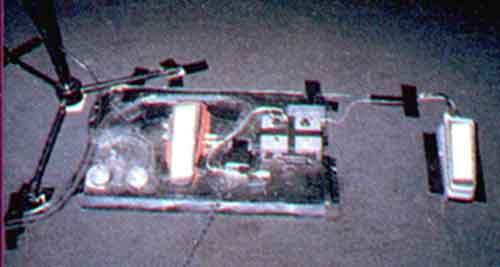
This picture appears courtesy of Mr. Kikukawa of Japan
Brian later introduced the Roland/Boss CE-1 Chorus Ensemble pedal. The CE-1 Chorus was later dismantled, modified and incorporated into a larger and more complex pedal board.
As Queen moved on to bigger things, so did their stage show. Brian needed
a more up to date system that would withstand the rigours of life on the
road.
In June 1982, Pete designed a pedal board and routing system that Brian
could take anywhere in the world.
A custom line driver was made to send the guitar signal, without any
losses, along a 100ft custom-built guitar lead.
The pedal board consisted of an input isolator, permanent Treble Booster
and a switchable 2nd Treble Booster. The second Treble Booster was added
for extra drive for certain guitar passages.
A modified Foxx phaser pedal was added with foot operated speed controller.
The modifications were as follows:
The potentiometer was fitted into a CryBaby chassis, as the original
speed control pedal was badly worn, along with a replacement heavy-duty
bypass switch. The CryBaby chassis was fitted on top of the pedal board.
The original Foxx circuit board was too large to fit in the CryBaby chassis
so Pete incorporated it into the pedal board with a built in 9v DC power
supply to power it. He did not do any audio modifications to it.
The Roland/Boss CE-1 Chorus Ensemble was stripped down and the circuit
board, with modifications, was fitted into the pedal board. Peteís modifications
involved level matching so as to allow the Treble Boost signal to pass
through it un-attenuated.
The Eventide Harmoniser foot controller was also added.
The pedalboard had built in footswitches and outputs to a remote rack
unit.
The pedal board can be seen below:
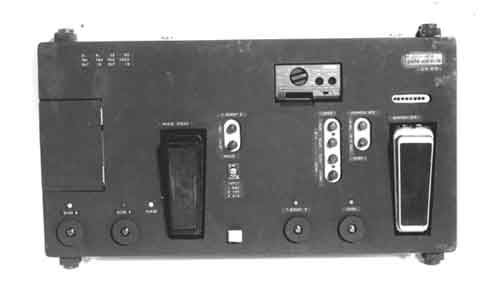
The Rack Routing Unit fed fourteen Vox AC30ís. The AC30ís were modified
by upgrading the power supply to reduce the hum. All the tubes were removed
from the Vibrato and Bright channel as Brian only used the Normal channel.
There were some cabinet modifications to improve airflow for cooling purposes.
Pete instigated all the modifications, component replacement and the
improvements in reliability.
Two MXR Digital delays were also incorporated.
The fourteen AC30 were routed as follows:
Three amps via delay no: 1
Three amps via delay no: 2
Five clean amps
Three amps via Boss CE-1 Chorus
Amp groups DL-1, DL-2 and Chorus could be muted by remote foot controls
on the pedalboard. The effects were not turned "off" at any time. Alternate
switching allowed the clean signal to be routed to all fourteen amplifiers
if desired.
The Rack Routing unit can be seen below:
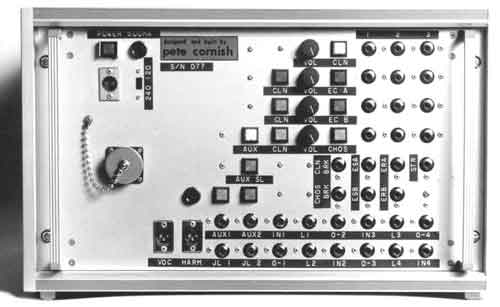
Pete also had to design a power voltage regulator to provide exactly
240V AC to each amplifier to maintain the tone for each performance.
The power voltage regulator unit can be seen below:
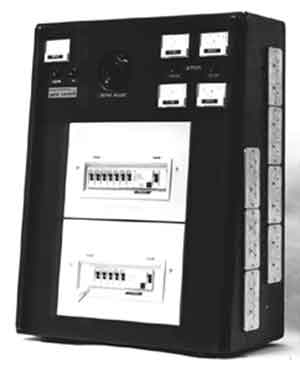
Pete also designed and built a custom bass rack for John Deacon. The custom bass rack can be seen below:
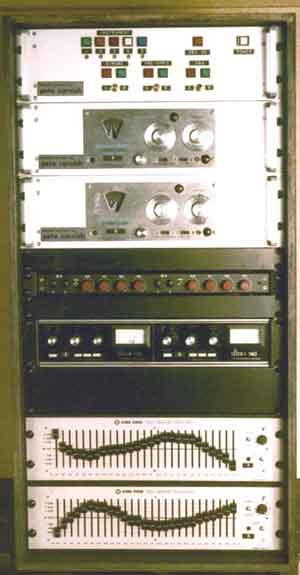
Pete continued to maintain and develop Brian Mayís equipment up to 1987.
The Pete Cornish Treble Boosters
TB-83:
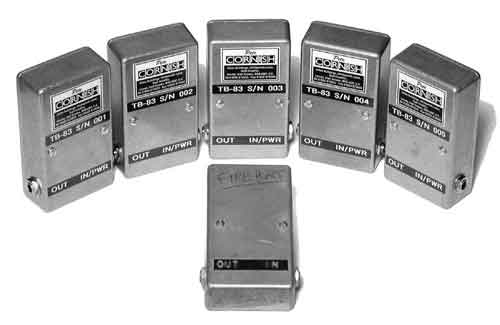
The "FIRST QUEEN" of Treble Boosts; this unit is the long awaited reissue
of the original early 1970s design by Pete Cornish
which was produced by us in exactly the same form until 1983.
The TB-83 is an exact replica of the early unit and uses the original
PCB layout and identical components sourced from the same suppliers.
The TB-83 is designed to improve the tone and overdrive characteristics
of the "Normal Channel" in early Vox AC30s adding "Bite" and
some "Dirt" to these low gain type of amps.
Each unit is independently hand built, wired and tested by Pete and
Lynda Cornish.
The battery is replaceable by removing the 4 screws (M3.5X10 PoziDrive
#2)
on the base of the unit and we recommend Duracell MN1604 batteries.
Ensure the new battery is inserted with the correct polarity.
The battery is switched on when you insert the "IN/PWR ON" jack and
to ensure long battery life unplug this lead when the unit is not in use.
If the unit is not to be used for a prolonged length of time we also
recommend that you remove the battery.
In 1984 we designed an upgraded version of the Treble Boost (TB-PLUS)
which incorporates Line Drivers and a Level Control. Both versions are
in current production and details of the TB-PLUS can be had on request.
The cost £179.95 (Incl. UK VAT)
TB-83 Extra:
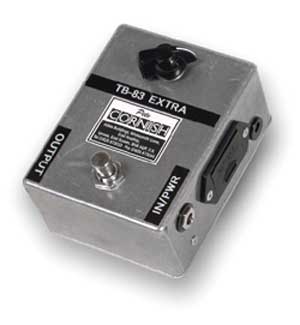
This is the second Pete Cornish Treble Boost designed and built by him
from the early 1970s and still in production. It is one of the original
versions supplied to Brian May and can be heard on Queen recordings. Pete
is still using the same artwork for the circuit board and identical components
are sourced from the original suppliers. Each pedal is individually hand
made by Pete and Lynda Cornish from the etching of the circuit board through
to the testing of the finished unit. No other person is involved in the
production. When used on it's own, the main use of this unit is between
the Guitar and "Normal" input of early Vox AC30s to improve the Tone and
Overdrive characteristics by adding some "Dirt" and "Bite" to this low
gain type of amp. The bypass footswitch may be used to completely disconnect
the TB-83 EXTRA from the guitar/amp circuit and the volume control may
be used to reduce the amount of boost, when switched on, presented to the
amp input.
The TB-83 EXTRA was designed to compliment the already in-line TB-83;
for solos and other artistic reasons the TB-83 boost was required to be
louder and with more "bite" to bring it above other instruments in the
live or recorded mix. There are two ways in which the TB-83 and the TB-83
EXTRA may be connected to bring out this extra benefit:
1) Guitar into TB-83 in; TB-83 out to TB-83 EXTRA in; TB-83 EXTRA out to amp in. TB-83 EXTRA volume control may be used to match the level when the TB-83 EXTRA is engaged and the additional treble boost will allow you to "cut through" the mix.
2) Guitar into TB-83 EXTRA in; TB-83 EXTRA out to TB-83 in; TB-83 out
to amp in. The TB-83 EXTRA volume control now has a completely different
function: it allows complete control over the "drive" into the TB-83 input
with a huge range of different sustain and harmonically rich distortion
products. The overall volume, however, will remain virtually constant but
the new singing tone will delight and excite you.
The cost £185.95 (Incl. UK VAT)
For information only, you can see other products made by Pete Cornish on the following websites:
http://www.pacifix-ltd.com/
http://petecornish.co.uk/
Please use the E-Mail address below to contact Pete Cornish for any
of his products.
For serious sales enquiries only,
Pete Cornish can be contacted on the E-Mail:
info@petecornish.co.uk
or by Tel/Fax:
Tel: +44 (0) 1825 873033
Fax: +44 (0) 1825 873044
Pete Cornish is a very busy man and his time is precious. Please
respect this.
Thankyou, Mark Reynolds.
We would like to hear from anyone who has purchased one of the Pete Cornish TB-83 Treble Boosters. If you could offer us a review, or your thoughts, we would be very grateful.
If you have anything to offer, please E-mail it to:
webmaster@brianmayworld.com
Please note that all pictures included in this article are Copyright
of Mr. Pete Cornish, except where indicated, and have been used with
permission.
They are presented on the web exclusively by www.brianmayworld.com